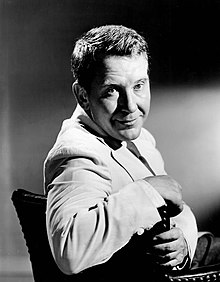
Back Burgess Meredith Afrikaans Burgess Meredith AN بيرجس ميريديث Arabic بيرجس ميريديث ARZ Burgess Meredith AST Bördcess Meredit Azerbaijani بورقس مریدیت AZB Burgess Meredith BCL Бёрджэс Мерэдыт Byelorussian Бърджис Мередит Bulgarian
Burgess Meredith | |
|---|---|
 Meredith in a publicity photo (1954) | |
| Born | Oliver Burgess Meredith November 16, 1907 Cleveland, Ohio, U.S. |
| Died | September 9, 1997 (aged 89) Malibu, California, U.S. |
| Alma mater | Amherst College |
| Occupations |
|
| Years active | 1929–1997 |
| Political party | Democratic |
| Spouses |
|
| Children | 2 |
| Military career | |
| Allegiance | |
| Service | |
| Years of service | 1942–1945 |
| Rank | |
| Unit | First Air Force Office of War Information |
| Battles / wars | World War II |
| Awards | |
| Acting President of the Actors' Equity Association | |
| In office 1937–1938 | |
| Preceded by | Frank Gillmore |
| Succeeded by | Arthur Byron |
Oliver Burgess Meredith (November 16, 1907 – September 9, 1997)[1][2] was an American actor and filmmaker whose career encompassed radio, theater, film, and television.
Active for more than six decades, Meredith has been called "a virtuosic actor" and "one of the most accomplished actors of the century".[3][4][1] A lifetime member of the Actors Studio,[5][6] he won a Primetime Emmy Award,[7] was the first male actor to win the Saturn Award for Best Supporting Actor twice, and was nominated for two Academy Awards.[7]
Meredith established himself as a leading man in Hollywood with critically acclaimed performances as Mio Romagna in Winterset (1936), George Milton in Of Mice and Men (1939), and Ernie Pyle in The Story of G.I. Joe (1945).
Meredith was known later in his career for his appearances on The Twilight Zone and for portraying The Penguin in the 1960s TV series Batman and boxing trainer Mickey Goldmill in the Rocky film series. For his performances in The Day of the Locust (1975) and Rocky (1976), he received nominations for the Academy Award for Best Supporting Actor. He later appeared in the comedy Foul Play (1978) and the fantasy film Clash of the Titans (1981). He narrated numerous films and documentaries during his long career.[8]
"Although those performances renewed his popularity," observed Mel Gussow in The New York Times (referring to the Penguin and Mickey Goldmill roles), "they represented only a small part of a richly varied career in which he played many of the more demanding roles in classical and contemporary theater—in plays by Shakespeare, O'Neill, Beckett and others."[1]
- ^ a b c Cite error: The named reference
datewas invoked but never defined (see the help page). - ^ "Burgess Meredith dies at 89". CNN. September 10, 1997. Archived from the original on July 25, 2012. Retrieved September 17, 2011.
- ^ "Lakewood Lore – Burgess Meredith". Lkwdpl.org. September 10, 1997. Archived from the original on September 30, 2006. Retrieved September 17, 2011.
- ^ "24 X 7". Infoplease.com. Retrieved September 17, 2011.
- ^ Garfield, David (1980). "Appendix: Life Members of The Actors Studio as of January 1980". A Player's Place: The Story of The Actors Studio. New York: Macmillan Publishing Co., Inc. p. 279. ISBN 0-02-542650-8.
- ^ Garfield, David (1980). "Strasberg Takes Over: 1951–1955". A Player's Place: The Story of The Actors Studio. New York: Macmillan Publishing Co., Inc. p. 278. ISBN 0-02-542650-8.
Aside from the original Robert Lewis group and those who came in with Mann and Meisner and were asked to remain, such individuals as Roscoe Lee Browne, Dane Clark, Tamra Daykarhanova, Rita Gam, Burgess Meredith, Sidney Poitier, Paula Strasberg, Anna Mizrahi Strasberg, and Franchot Tone have been voted directly into membership by the Studio's directorate or by Strasberg himself. In the early sixties, several actors who performed with The Actors Studio Theatre were similarly admitted
- ^ a b "Overview for Burgess Meredith". TCM. Archived from the original on April 3, 2009. Retrieved September 17, 2011.
- ^ "Overview for Burgess Meredith". Turner Classic Movies. Retrieved March 19, 2016.